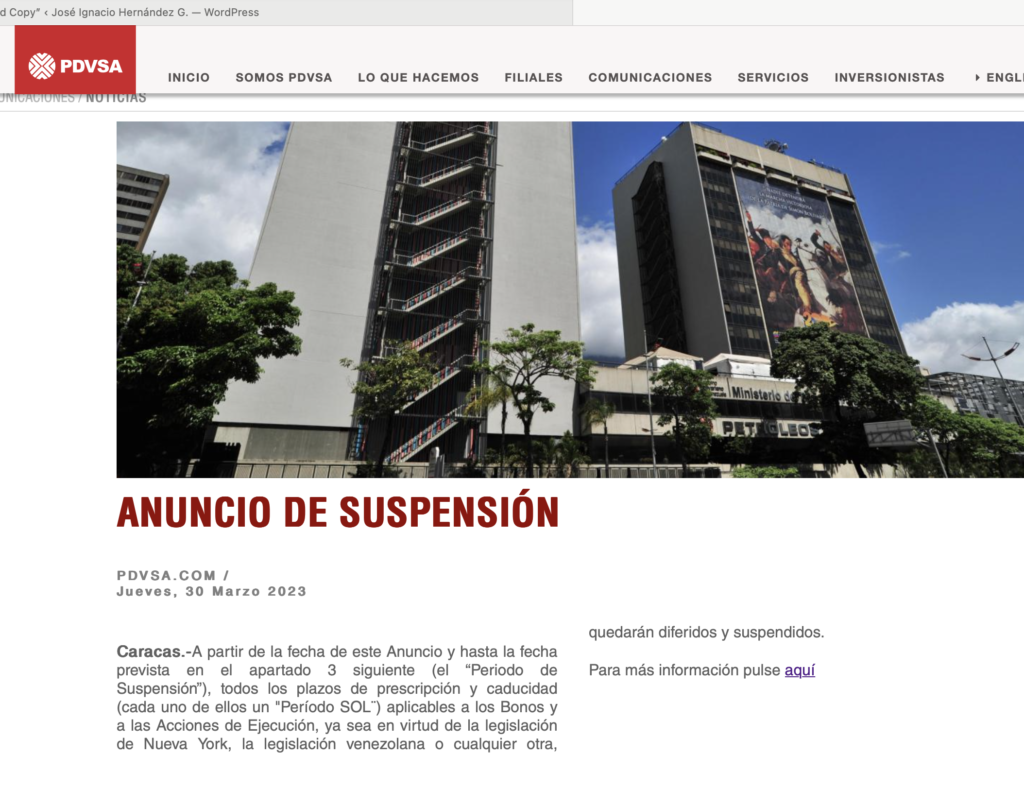Can Maduro´s Government suspend the statute of limitations on Venezuela bonds?

On March 30, 2023, the Finance Ministry of Venezuela and PDVSA announced the suspension of the statute of limitations applicable to the Venezuelan bonds. However, there is a problem: Nicolás Maduro cannot legally represent the Government of Venezuela in the U.S.
The bonds issued by the Republic and PDVSA, subject to the New York Law, are ruled by a six-year statute of limitations. If bondholders do not file a claim within six years after the issuer has defaulted, they will be barred from doing so. Maduro announced the debt default in November 2017, so the six-year period could expire soon. Two remedies are negotiating an extension of the lapse or filing a claim before the expiration of the statute.
Maduro is attempting a new approach: the Republic and PDVSA announced the unilateral suspension of the statute of limitation lapse. The real question is not whether the issuer can unilaterally modify the lapse established in the emissions agreements but whether Maduro can legally represent the issuer. And the answer is no.
The U.S. doesn’t recognize the Government of Maduro since January 23, 2019. This means Maduro can’t represent Venezuela or PDVSA legally. The legal representation shifted to the speaker of the 2015 National Assembly from January 23, 2019, to January 3, 2023, who acted as Interim President. But the National Assembly decided to disband the Interim President, so neither Maduro nor the 2015 National Assembly can legally represent Venezuela’s Government in the U.S.
It’s important to know that the U.S. Government hasn’t recognized the 2015 National Assembly as the official holder of Venezuela’s Presidency. Although the U.S. Government supports the 2015 National Assembly, it doesn’t mean they recognize it as the legal representative of Venezuela in the U.S.
In addition, it’s important to note that the Administrative Council of Assets Protection appointed by the National Assembly has not been recognized as the legal representative of the Government of Venezuela. This Council is a parliamentary commission, not an executive body, and cannot exert the authority of the Presidency in accordance with the Venezuela Constitution. Therefore, the Council also cannot legally represent the Government of Venezuela in the U.S.
Consequently, the unilateral offer made by Maduro’s Government is not binding in the U.S. and cannot change the statute of limitations under New York Law. Furthermore, due to the National Assembly’s decision, implementing Maduro’s offer through the Interim Presidency is not possible.
One possible bold strategy for Maduro, given the absence of a legally recognized government of Venezuela, is to claim before U.S. courts that as a non-recognized government, he still has the authority to represent the country. Maduro has attempted this strategy in the past but failed due to the legal recognition of the Interim President. With the current conditions, there is a possibility of success, but it should be noted that even if he prevails, his status in the U.S. will be severely restricted.
Time is ticking, and the statute of limitations won’t resolve itself. But before anything can be done, a crucial question must be answered: who is the Government of Venezuela legally recognized in the U.S.? Until this issue is resolved, any attempts to address the statute of limitations problem will be in vain.